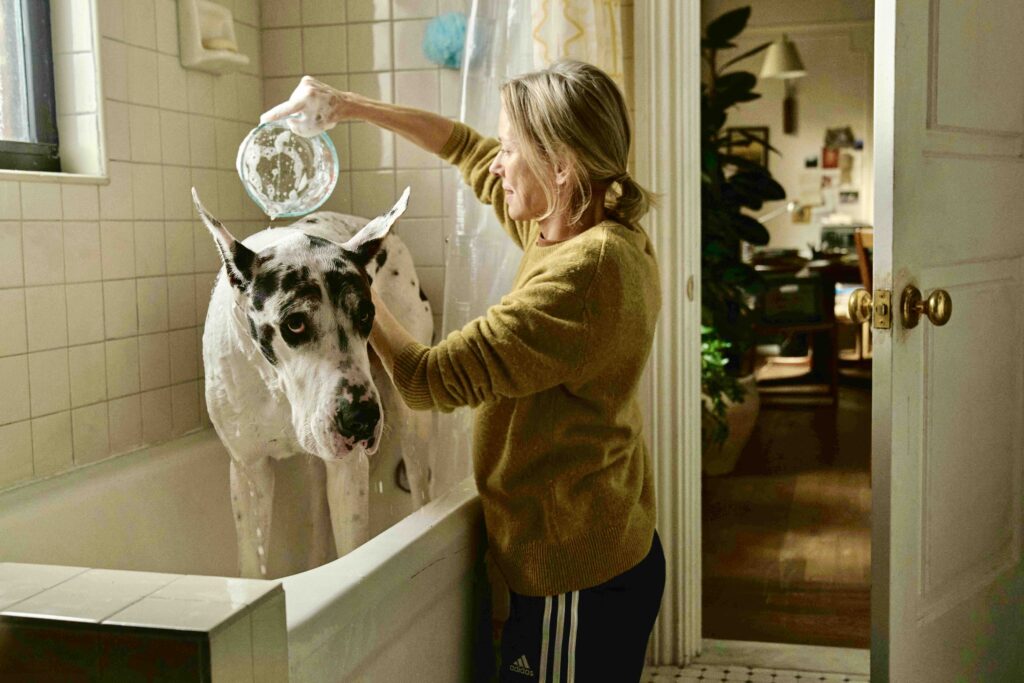
(***)
Damn that’s a big dog. A big sad dog. So, what’s his problem? Well, he’s in mourning…
The novel The Friend, by Sigrid Nunez, doesn’t tell this lives-after-death story from the canine’s point of view. Instead, it shares the perspective of his new shell-shocked owner, the person who inherits him. In the book, much of the narrative is in people’s heads, and the characters have no names. In this film adaptation, by writers/directors Scott McGehee and David Siegel, people have names, they talk and spill the beans.
Often the target of their anecdotes and gossip is Walter (Bill Murray), the deceased patriarchal figure of their extended clan. His passing unites them. He’s either their father, ex-husband, ex-lover or in the case of Appollo (Bing) the Great Dane, his dear and departed master. In his day, Walter had one foot in the world of literature, the other in academia and all the women he wanted. He was a player.
His former wives and present widow bear witness to his philandering: Wife #1, Elaine (Carla Gugino, Spy Kids), is oh so woeful. The very cranky second ex named Tuesday (Constance Wu, Crazy Rich Asians) is despised by all. While Barbara (Noma Dumezweni, Dirty Pretty Things), who’s British, is all business and the last wife left standing. The exes have gotten off light. Walter’s mentee will suffer the most.
That’s Iris (Naomi Watts, 21 Grams), a petite English teacher who was Walter’s protégé. She gets stuck holding the bag. Or more specifically, Walter’s 150-pound black and white Great Dane, Appollo. Hard for her to fit the beast in her cramped 500-sq. ft, New York City studio apartment. Adding insult to injury, the ungrateful, bogarting pooch appropriates her bed and the no-dogs-policy landlord is so upset Iris may be evicted. Now the poor put-upon woman is coping with her mentor’s death, learning how to be a dog whisperer and riding on the edge of homelessness.
As Iris tries to find her bearings, the audience gets pulled into a storyline that gets sweeter and tenderer by the second. Be forewarned, if you didn’t like big dogs before you saw this film, you’ll be admirers by the time it ends. You’ll become partial to this regal, behemoth canine. You’ll appreciate his majestic gait and strong, silent persona. Appollo’s doe eyes, mammoth paws and the deep sighs pull you into his dilemma. As he grieves, adjusts to new surroundings and deals with a woman who prefers cats, your empathy isn’t given, it’s stolen away.
Iris’s ever-evolving adaption to her new circumstances doesn’t get old. It’s a learning process viewers will savor. The emotional hooks pile up and life lessons do too as the four-legged friend becomes a blessing for all. Wisely McGehee and Siegel’s script keeps the drama in the present with a few flashbacks. Their one mistake is a scene towards the end that has Iris and Walter talking, long after he’s been dead. It’s a blunder that messes up the well-established and charming day-to-day reality and kills momentum.
Yes, this is a love letter to the canine community. It’s also one of the warmest depictions of New York in recent memory. A wishful image of present-day Gotham. Clean streets. No rats in the subway. Few to no homeless folks living desperate lives. An absence of belligerent people. A calmness that doesn’t’ exist. It’s almost like a Woody Allen film, only there’s a talented Black actress in a key supporting role, and that’s how you know it’s not. This is an elongated (editor Isaac Hagy, Atlanta), 1h 59m “I love New York” commercial masquerading as an indie film. Disarming in a beguiling way.
The ensemble cast doesn’t miss a beat. Gugino, Dumezweni and Wu deserve special mentions. Ditto Sarah Pidgeon for her ultra natural performance as Val, Walter’s blasé daughter from a fling. Felix Solis (Ozark) excels as Hector the building’s super, but oddly he has one major lapse in judgement. He calls Iris, “Miss Iris,” which seems dated and way too subservient. The always fun to watch Murray doesn’t get to deliver the film’s most ironic line, instead it’s said by someone else who recollects his humor: “The more suicidal people they are, the less suicidal people there are.”
Bing steals 50% of the scenes, without saying a word. It’s all in his eyes, though some may wish at some point he’d let go and howled at the moon. Watts steals the other 50% from him. Her Iris possesses a wondrous naiveté. As she goes on a voyage of self-discovery, that excursion becomes increasingly charming. Watts makes each of her cathartic moments worth the wait: “I am the emotional support human and it’s the dog that can’t cope.” Her best scene is inside a shrink’s office, on a couch, where emotions get the best of her. A river of tears flows. It’s a cleansing. A turning point Watts mines it like a champ.
Giles Nuttgens’ (Hell or High Water) cinematography captures that special lighting the sun spreads on Greenwich Village in ways that New Yorkers will recognize. Costume designer Stacey Battat’s clothes fit the characters just fine. Apartments and offices look lived and worked in (set decorator Eric Tumolo and production designer Kelly McGehee, American Honey). There are lots of spaces in between the dialogue, which give the narrative time to breath. Composers Trevor Gureckis and Jake Wadley take this time to intensify emotions with bassoons, sensitive string music and delicate chords on the piano.
Iris has a lot to learn: “I feel like my life story is being written by somebody else.” Appollo does too: “How can you explain death to a dog?” And so, they’ll learn about loss and coping, together. And if they try really hard, the big sad dog may become the big well-adjusted dog. And that will suit adult audiences just fine.
Trailer: https://www.youtube.com/watch?v=K2Df2g0Gl6o
Visit Film Critic Dwight Brown at DwightBrownInk.com.